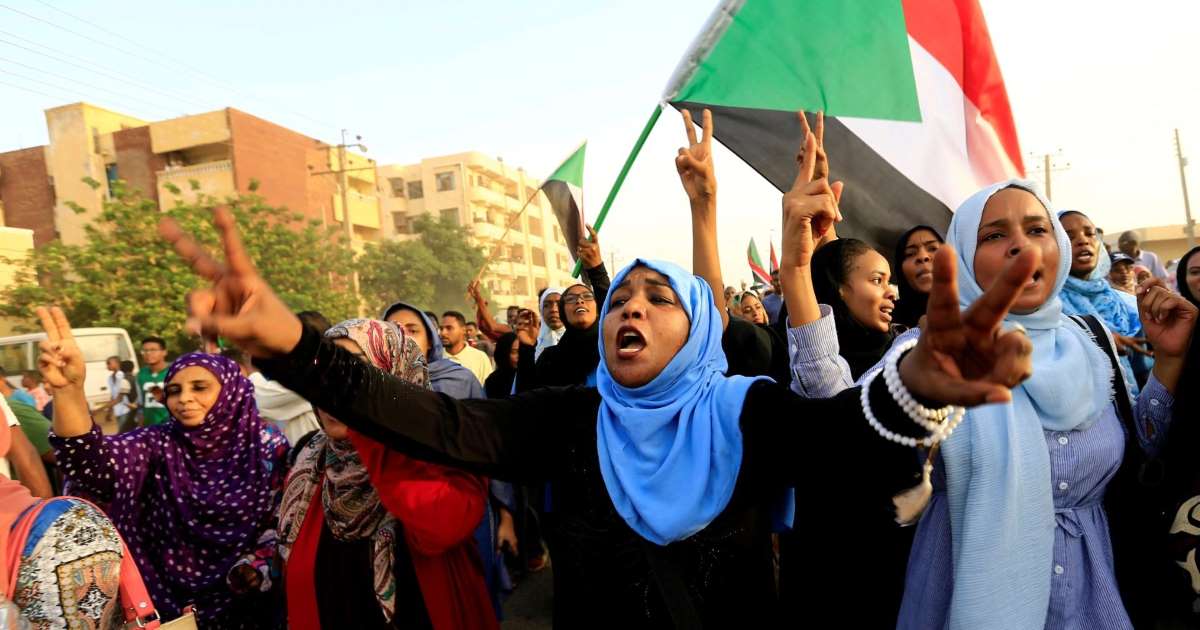Since the widespread anti-austerity protests that began in December 2018, and the subsequent coup d’etat deposing long time president Omar al-Bashir in April 2019, Sudan’s political history has defied the popular narratives of Western media. For years, the transgressions, repressions, and violence of Bashir’s presidency made Sudan the object of an almost ecstatic moral panic on the part of the West. Campaigns led by celebrities such as George Clooney and Mia Farrow raised public awareness of the violence in South Sudan and Darfur. These campaigns painted a simplistic picture of the violence’s causes and directed their rhetoric against Bashir’s administration and obscured the many other structures, both inside and outside Sudan, that allowed for such abuses.
Sudan, for centuries, has been caught up as a pawn in geopolitical games against the will of the Sudanese people. British rule organized Sudan’s economy and government for the efficiency of economic exploitation and colonial management. This legacy left the nation politically centralized and unevenly developed even after it achieved independence in 1956. Following independence, two successive civil wars that involved over a dozen foreign powers prevented the new nation from achieving sovereignty. Sudanese civilians were among the first to fall victim to the U.S. War on Terror when President Clinton destroyed the Al-Shifa pharmaceutical factory with an airstrike in 1998 ğ according to the German diplomat Werner Daum, this may have resulted in “several tens of thousands of [civilian] deaths.” Whether this act was truly intended to cease production of nonexistent nerve agents, or to distract from the ongoing Monica Lewinsky scandal, this heinous act only furthered the legacy of Western imperialist violence.
Bashir was only really held accountable from global powers when he acted as a geopolitical pariah by supporting Ba’athist Iraq, sheltering Osama bin Laden, and allying his country (and its resources) with Russia and China. But the U.S. and its allies have not held Sudan to any humanitarian standard for long. Barack Obama eased sanctions on Sudan in January 2017 as one of the last major acts of his presidency. This coincided with the construction of a massive CIA complex in the capital Khartoum. Bashir was instead rewarded when he and his associates cooperate with the interests of American allies, including patrolling migratory routes through Northern Africa, and murdering displaced people seeking refuge in Europe.
The people of Sudan, long depicted as passive victims, have now become an active force in their country’s future. Bashir’s departure alone does not meet the public’s demand for institutional change. If the current course continues, a sluggish democratization process will ensue and the Sudanese military will retain an official role in civilian politics for several years to come. Many Sudanese people prefer this slow process of reform to the precedent of indefinite dictatorship set by Bashir. In addition, they support the goals of this process that includes free elections and an end to the war in Darfur. However, the institutions steering democratization should not be spared skepticism. Neither the Transitional Military Council formed by the remnants of Bashir’s regime nor the officially sanctioned liberal opposition coalition Forces of Freedom and Change has matched the people’s passion for rapid and radical change.
The Tunisian Revolution demonstrated that the general populace and labor force must be actively mobilized, in order for even basic democratic reforms to take hold. The Sudanese Communist Party (SCP) has absorbed this lesson: Dr. Sigdi Kaballo, an SCP leader and former longtime political prisoner of the Bashir regime, cited the role played by Tunisian trade unions as a model for their counterparts in Sudan. For this reason, the SCP is one of the few groups to demand an immediate transition to civilian rule.
The SCP, and other Sudanese socialists, have a unique opportunity in the current political moment because material contradictions are front and center. The uprising which ousted Bashir was actually instigated by an International Monetary Fund enforced austerity budget which threatened ordinary Sudanese households’ access to basic necessities. If the future democratic government fails to address material necessity and reject the Washington consensus, they will prove themselves to be no more trustworthy than the authoritarian government of the last several decades.
Only a socialist Sudan will place material needs over the demands of global capital. Only a socialist Sudan can begin to reverse the centuries of uneven development that lie at the heart of all of its many region conflicts. Only a socialist Sudan can weather the many threats to its stability the country will face, both familiar — political interference by regional rivals such as the Muslim Brotherhood and Saudi Arabia — and emergent — the effects of environmental degradation especially acute in the Sahara and its expanding frontiers. The Western media will no doubt fail to scrutinize material conditions under any forthcoming system of governance. The foundation of a liberal democracy — one propped up by a powerful military deep state — will signal a victory for Western political morality, even if it fails to confront these challenges. However little the West sees of the struggle for material gains, the Sudanese people can see this struggle just fine, and will not let it die.

